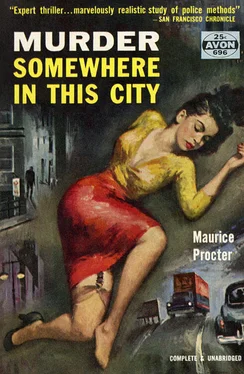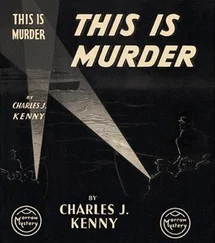Maurice Procter - Murder Somewhere in This City
Здесь есть возможность читать онлайн «Maurice Procter - Murder Somewhere in This City» весь текст электронной книги совершенно бесплатно (целиком полную версию без сокращений). В некоторых случаях можно слушать аудио, скачать через торрент в формате fb2 и присутствует краткое содержание. Год выпуска: 0101, Издательство: Avon, Жанр: Полицейский детектив, на английском языке. Описание произведения, (предисловие) а так же отзывы посетителей доступны на портале библиотеки ЛибКат.
- Название:Murder Somewhere in This City
- Автор:
- Издательство:Avon
- Жанр:
- Год:0101
- ISBN:нет данных
- Рейтинг книги:5 / 5. Голосов: 1
-
Избранное:Добавить в избранное
- Отзывы:
-
Ваша оценка:
- 100
- 1
- 2
- 3
- 4
- 5
Murder Somewhere in This City: краткое содержание, описание и аннотация
Предлагаем к чтению аннотацию, описание, краткое содержание или предисловие (зависит от того, что написал сам автор книги «Murder Somewhere in This City»). Если вы не нашли необходимую информацию о книге — напишите в комментариях, мы постараемся отыскать её.
Murder Somewhere in This City — читать онлайн бесплатно полную книгу (весь текст) целиком
Ниже представлен текст книги, разбитый по страницам. Система сохранения места последней прочитанной страницы, позволяет с удобством читать онлайн бесплатно книгу «Murder Somewhere in This City», без необходимости каждый раз заново искать на чём Вы остановились. Поставьте закладку, и сможете в любой момент перейти на страницу, на которой закончили чтение.
Интервал:
Закладка:
“I will, don’t worry,” Devery replied with a smile. But he was thinking, as other young policemen were thinking at the same moment, that if he got a glimpse of Starling he would take almost any chance to make an arrest.
“Think on,” said the other man, not entirely convinced. “Our Silver wouldn’t like it if you got hurt.”
Devery used that remark to open another topic. “Silver and I are thinking of getting married soon,” he said.
Furnisher was startled. He looked quickly from the young man to the girl. Then he sighed. “Aye, I suppose it’s only natural,” he said. “A bit sooner nor I expected, though.”
Devery grinned at him. “You were young once yourself, you know.”
“Yes, and I were a proper buckstick, an’ all. I’ll not stop you. But there’s no need for you to go off and set up for yoursel’s. Silver’ll none want to leave her old granddad on his own. This place is big enough for three-or maybe more.”
“We thought you’d want us to stay,” said Devery, and he could see that his use of the plural hurt a little. “We’ll do that, temporarily at least. But Silver wants us to do the place up a bit. Some new furniture, and that. We’ll want something of our own, so I’ll buy it.”
“No need, lad, no need. If ther’s one thing we aren’t short on, it’s furniture.” He looked around the room. “Silver’s been bothering about new furniture for some time. Aay well, I suppose a young woman likes to see a change once in a while. We’ll have decorators in, and if there’s nothing in the shop what you want, you can see what’s in the catalogues of the firms I deal with. Unless-” he looked hopeful-“you’d like to see if there’s owt upstairs you want.”
Devery looked at Silver, who was following the talk with interest. He made a brief soundless remark to her, and they smiled at each other.
“Nothing doing, old boy,” he said. “We don’t want to seem ungrateful, but we don’t want any of your antiques.”
The top floor of Furnisher’s shop-home-warehouse was crammed with his “antiques.” Most of them were pieces of Victorian furniture which were in appalling taste by any standard except that of their period. During his business lifetime he had acquired them for next-to-nothing because people would no longer have them in their houses. He believed that before he died, or shortly after his death, the circular trend of fashion would make them into valuable collectors’ items. He had so much old furniture on the top floor that he did not know what he had. Some of it he had not seen for years, because he did not go up there for an occasional gloat as he might have been expected to do. The furniture was covered with dust, mainly forgotten, and seldom visited. The top floor was a bothersome thing in Silver’s tidy mind. She often threatened to go up there and sail into action with dusters and a vacuum cleaner.
Now, with her fingers, she repeated the threat.
Devery replied in a combination of sign and lip language. “You don’t want a duster, sweetheart. Take an axe.”
The old man took it all in good part. “You’ll see,” he said. “Ther’s some good stuff upstairs. It’ll be worth a mint o’ money one of these days.”
“I dare say you’re right,” said Devery tolerantly. “But we don’t have to live with it, do we?”
7
Martineau’s wife may have been out at teatime-Tea-time on Sunday meant that she had taken a bus journey to see her parents. Fair enough-but she was waiting, unshakably decorous, when he arrived home at half past ten. “Hello,” he said as he entered the house. She looked at him, but she did not reply.
He went into the kitchen. He was hungry. He had had one sandwich since breakfast, and a few glasses of beer since nine o’clock. Nowadays he always seemed to need a drink after a long day’s work; or perhaps it was not the work but Julia, Julia waiting for him with a grievance. Dutch courage.
He looked in the oven. His dinner was there: cold, congealed, unappetizing. Part of it was a cold rice pudding. He removed the pudding-he did not want it-and switched on the heat to warm up the remainder.
From his movements she guessed what he was doing. “Are you going to waste that pudding?” she demanded.
“I’m not going to eat it, if that’s what you mean,” he replied.
“It’s sinful,” she said. “I waited all afternoon with the table set.”
A slight exaggeration. He let it go.
“How would you like to spend a fine Sunday afternoon sitting waiting to wash up after somebody?” she wanted to know. “So busy. Such an important man. Couldn’t spare one minute in all the livelong day to phone his home.”
He let that go, too. But: “Did you have tea at your mother’s?” he asked politely.
That checked her. In the same polite tone he followed up: “How is the old hellion?”
She was coldly contemptuous. “Guttersnipe talk doesn’t become you,” she said. “But perhaps you can’t help it.”
“No, I can’t. And she is, isn’t she? Look what she’s done to your stepfather. He started to disintegrate as soon as she married him. One of these days he’ll just fall to pieces, and she’ll be looking for her third.”
She looked at him with narrowed eyes. He had never been deliberately offensive about her mother before. He never sought trouble as a rule. What was the matter with him?
In their most vehement squabbles she had never once thought that their marriage might be broken up. They were husband and wife, and if they quarreled, well, he was in the wrong. It was-as she saw it-her duty as a wife to try and make him behave like the man she wanted him to be. She thought that she railed at him for his own good, to keep him up to the mark, to suppress his natural-but deplorable-masculine proclivity for low pubs, low companions, slack behavior and general vulgarity. She would have been shocked and humiliated if she had known that he had wearily ceased to care what happened to their marriage, and that once or twice he had actually wished that she would leave him.
Her belief in the permanency of their union was reasonable. She was a product of the police tradition of happy marriage. If a policeman was not happily married, he had to pretend to be. Even in so-called enlightened times, divorce or separation was frowned upon by police authorities. Policemen had to be respectable, and ambitious policemen had to be very respectable. A break between Martineau and his wife, with maintenance or alimony decided in court, would destroy all his prospects of promotion. His wife never suspected for one moment that he would consider parting from her and ruining his career.
So, now, she could see only one reason for his unusual aggressiveness. He was intoxicated. He concealed it very well, but he had had too much to drink.
“You’re drunk,” she said.
“I am not drunk,” he replied.
“You ought to think about your position before you go and get too much to drink in a pub. You ought to think about your wife and your home. You’ve got responsibilities.”
“Responsibility. Singular. If it were plural there’d be a different atmosphere in this house.”
Not that again, she thought. Always on about children! It was getting worse! Of course, drunken men always got sentimental about little toddlers.
She did not answer him, but rose from her chair and began to set the table. She thought she had better get out his supper and carry it from the kitchen. She was afraid that-being drunk-he might stumble and spill gravy on the carpet.
“You needn’t bother. I can do it,” he said.
She brought the warm plate and put it on a cork mat. “Get your supper,” she said.
He began to eat.
Читать дальшеИнтервал:
Закладка:
Похожие книги на «Murder Somewhere in This City»
Представляем Вашему вниманию похожие книги на «Murder Somewhere in This City» списком для выбора. Мы отобрали схожую по названию и смыслу литературу в надежде предоставить читателям больше вариантов отыскать новые, интересные, ещё непрочитанные произведения.
Обсуждение, отзывы о книге «Murder Somewhere in This City» и просто собственные мнения читателей. Оставьте ваши комментарии, напишите, что Вы думаете о произведении, его смысле или главных героях. Укажите что конкретно понравилось, а что нет, и почему Вы так считаете.












